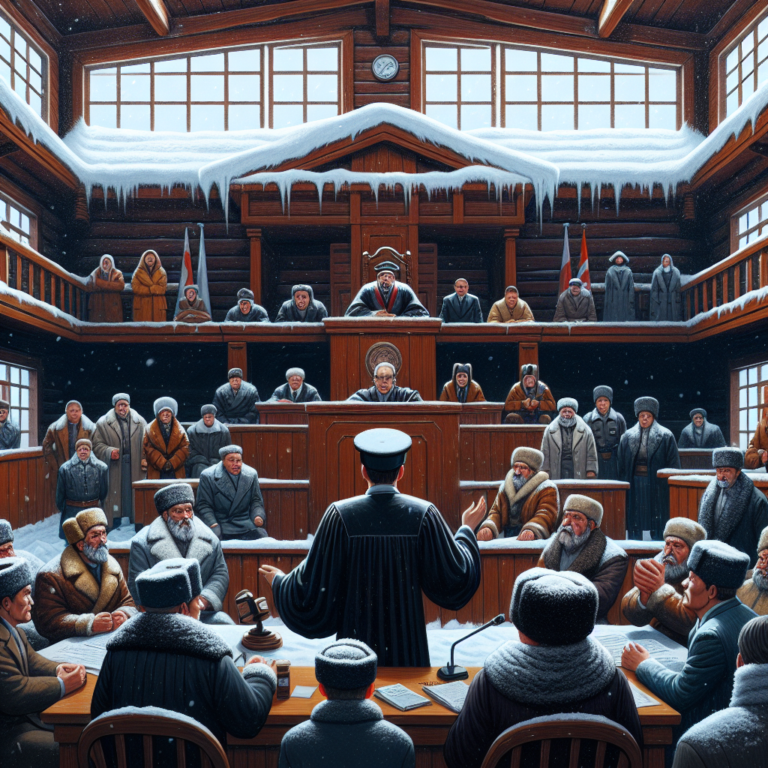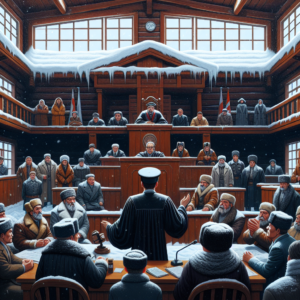Фото: Максим Кимерлинг / Коммесарсантъ.
«I am ready to give credit to the greatness of the banner, but from your shamelessness the paper ignites». B. Grebenshchikov*
Christ and Class Struggle
And do you remember your school history textbook on the Ancient World? Most likely, we had the same one – several generations of Soviet children studied from F. Korovkin’s textbook. In my time, the cover featured the image of the Syrian Palmyra, which now only exists in pictures and memories.
In this textbook, three and a half pages were devoted to the topic of “The Emergence of Christianity.” It was the first and, it seems, the last mention of Jesus Christ in the school program, which apparently was supposed to provide comprehensive knowledge about Him to the future Soviet citizens.
History was studied in the light of class struggle, and the emergence of Christianity was explained, of course, in the context of its intensification: the reason for its emergence was not the personality of Jesus Christ and His teachings, but the sad fact that “oppressed people lost hope of achieving liberation in the struggle against their oppressors.”
According to the author of the textbook, Christianity, “preaching patience and obedience, distracted slaves and the poor from the struggle against exploiters.” The textbook contradicted itself by acknowledging the spread of Christianity among both the poor and the rich. Furthermore, talking about the persecutions by Emperor Diocletian, who “demanded complete submission from the entire population of the empire,” the author of the textbook does not explain why Christians – supposedly the most loyal subjects of the empire – refused to participate in the imperial cult and became targets.
The textbook “History of the Ancient World.” From the entire New Testament corpus, the textbook selected three quotes for familiarity with Christianity: “Fear God and honor the king” (1 Pet. 2.16); “Let every soul be subject to the governing authorities, for there is no authority except from God, and the authorities that exist are appointed by God” (Rom. 13.1); “Whoever resists the authority resists the ordinance of God, and those who resist will bring judgment on themselves. For rulers are not a terror to good works, but to evil. Do you want to be unafraid of the authority? Do what is good, and you will have praise from the same. For he is God’s minister to you for good. But if you do evil, be afraid; for he does not bear the sword in vain; for he is God’s minister, an avenger to execute wrath on him who practices evil” (free rendering of the 13th chapter of the Epistle to the Romans).
Thus, for several decades, Soviet schoolchildren were instilled with the awareness that Christianity teaches unconditional submission to authority because it has divine nature. In fact, servility is the essence of Christian teaching. Is this really the case?
According to the American biblical scholar Walter Pilgrim, there is no unified teaching in the New Testament on how a Christian should relate to the state. More precisely, there are three different approaches to the relationship between a Christian and the state. The first is the attitude of subordination/submission, found in the Epistles of the Apostle Paul and the Epistles attributed to him. The second approach Pilgrim calls “critical distancing” – it is well expressed in the four Gospels. And finally, resistance to the state – a position expressed by the Apostle John in the book of Revelation.
Let’s try to understand this.
Under whose authority was Jesus executed?
So, in the Epistle of the Apostle Paul to the Romans, we read:
“Let every soul be subject to the governing authorities. For there is no authority except from God, and the authorities that exist are appointed by God. Therefore whoever resists the authority resists the ordinance of God, and those who resist will bring judgment on themselves. For rulers are not a terror to good works, but to evil. Do you want to be unafraid of the authority? Do what is good, and you will have praise from the same. For he is God’s minister to you for good. But if you do evil, be afraid; for he does not bear the sword in vain; for he is God’s minister, an avenger to execute wrath on him who practices evil. Therefore you must be subject, not only because of wrath but also for the sake of conscience. For because of this you also pay taxes, for they are God’s ministers attending continually to this very thing. Render therefore to all their due: taxes to whom taxes are due, customs to whom customs, fear to whom fear, honor to whom honor” (Rom. 13.1–7).
This is the longest passage of the Sacred Scripture concerning the relationship between man and the state.
Another important testimony is the first Epistle of Peter, where we read:
Therefore submit yourselves to every ordinance of man for the Lord’s sake, whether to the king as supreme, or to governors, as to those who are sent by him for the punishment of evildoers and for the praise of those who do good. For this is the will of God, that by doing good you may put to silence the ignorance of foolish men— as free, yet not using liberty as a cloak for vice, but as bondservants of God. Honor all people. Love the brotherhood. Fear God. Honor the king” (1 Pet. 2.13–17). The overall sentiment is similar to that in the Epistle to the Romans.
The Apostle Paul does not provide a clear answer to the question of when and why one should obey a state that abuses its power. Pilgrim suggests six possible explanations of Paul’s rhetoric – a kind of theological disclaimer:
– in the opinion of the biblical scholar, the Apostle Paul unveils a new ethics based on love, and obedience to authority is one of its external manifestations. Furthermore, the words of the Apostle convey a tense anticipation of the second coming; obedience to earthly authorities will last only a short time;
– for Paul and the early Church, there is only one Lord; the Greek “Kyrios” is the most common name for the Savior in the Epistles of Paul;
– the Apostle believes that the true citizenship of Christians lies in the life of the future age. Therefore, earthly power is transient and not absolute;
– at the center of his preaching is the image of the crucified Christ. By regularly referring readers to this image, Paul reminded them of the injustice of Roman rule. The Apostle was not naive enough not to understand by whose authority Jesus Christ was executed;
– Paul’s personal experiences with Roman justice, reflected in the Acts of the Apostles and his Epistles, testify that he hardly expected peaceful relations with civil authorities;
– Romans 13 and other texts speak only of obedience to authorities, even if the consequence of such obedience is suffering for the faith. Ultimately, Paul’s message is about patiently enduring suffering, not complying with the absurd commands of authorities.
Archimandrite Iannuary (Ivliev), a Russian biblical scholar, offered his interpretation of this text. In the Greek text, the term for authority is not “from God” but “under God,” meaning it refers not only to the establishment of authority by God but also to the fundamental subordination of authority to God. Furthermore, the Apostle writes that authority is merely a servant, a slave of God (Rom. 13.4). In the Russian Synodal translation, there is an inaccuracy: “the ruler is God’s servant,” while in the original, authority is “servant of God,” and one can obey it only if it is not deaf to the heavens.
Andrei Desnitsky, in turn, raises the question: “If every authority is from God, why did great saints conflict with earthly authorities, even if the rulers formally professed Christianity? But then how do we know when to obey and when not to? Which laws should be followed, and which shouldn’t? Martin Luther King provided a simple answer: ‘There are two kinds of laws: just and unjust. I am ready to defend just laws. A man has not only a civil but also a moral duty to obey just laws. Accordingly, a man has a moral obligation not to comply with unjust laws. I would agree with the Blessed Augustine: ‘An unjust law is no law.’ What is the difference between them? Any law that exalts the human personality is just. Any law that debases the human personality is unjust. We must never forget that everything done by Adolf Hitler in Germany was ‘legal.’ (Letter from Birmingham Jail.)
What do we owe to Caesar?
Pilgrim calls another New Testament position “critical distancing.” It is most vividly expressed in the gospel narrative that raises questions not only about the relationship with the occupying Roman authority but also with authority in general. The question of a relationship with the state becomes acute when Jesus is asked a provocative question about paying taxes to the emperor (Mark 12:13–17, Matthew 22:15–22, Luke 20:20–26). Jesus avoids the provocation, but His response “render to Caesar the things that are Caesar’s, and to God the things that are God’s” remains mysterious. What exactly belongs to God, and what belongs to Caesar? Caesar’s expectations about what is due to him vary. A totalitarian state wants complete control over people. What if in Caesar’s place there is an arrogant thug?
In Chapter 17 of the Gospel of Matthew, Jesus asks: “Tell us, therefore, what do You think? Is it lawful to pay taxes to Caesar or not?” But Jesus perceived their wickedness, and said, Why do you test Me, hypocrites? Show Me the tax money.’ So they brought Him a denarius. And He said to them, ‘Whose image and inscription is this?’ They said to Him, ‘Caesar’s.’ And He said to them, ‘Render therefore to Caesar the things that are Caesar’s, and to God the things that are God’s'” (Matthew 22:17–21). Jesus avoids the provocation and performs an act of grace rather than fulfilling a sacred duty. His disciples are called free in relation to earthly authority; they are children of the king.
In the early 20th century, Archimandrite Spiridon (Kislyakov) proposed an interesting interpretation of the story about taxes. Only the coins bearing Caesar’s image belonged to him, that is, money. Nothing else.
The confrontation between Jesus and earthly authorities reaches its climax on the last pages of the gospel narrative, starting from the entry into Jerusalem. According to Pilgrim, “the image of the humble King, who rides on a donkey, a lowly creature for carrying loads, subverts our notions of the fullness of power. Power and dominion are understood here through diminishment, service, and reconciliation. It is a kingdom without violence, national pride, or imperial superiority. In this sense, the entry presents a paradigm of authority that challenges all existing notions, past and present.”
Inside out State
Apostle John uses several images of the state. The first of them is the image of the beast (τό θηρίο) in the 13th chapter of the Apocalypse. More precisely, two beasts, one of which presumably represents the empire, and the other – local authorities in Asia Minor. This beast demands not only obedience but also worship: “And authority was given him over every tribe, tongue, and nation. All who dwell on the earth will worship him, whose names have not been written in the Book of Life of the Lamb slain from the foundation of the world” (Revelation 13:7–8).
Another image of the empire, which appears in the 17th chapter of the Apocalypse, is the ἡ πόρνη, which can be translated into Russian as “whore,” or using a Slavic euphemism, “prostitute.” There is no doubt that it refers to the empire: “sitting on many waters,” “seven mountains on which the woman sits,” and “the great city that rules over the kings of the earth” point to Rome. John portrays the image of an anti-Eucharist: “And I saw the woman, drunk with the blood of the saints and with the blood of the martyrs of Jesus. And when I saw her, I marveled with great amazement.” The state, which should ensure peace and justice, is turned upside down.
Finally, the last image that arises in the 14th chapter and is elaborated in the 18th is the image of Babylon.
Babylon System – Bloodsucker.
It sucks the blood of children day by day!
And I say, the Babylon system – bloodsucker, falling empire,
Sucking the blood of the sufferers.
– sang Bob Marley, understanding that Babylon did not fall with the fall of Rome. Any system aimed at enslaving humanity becomes Babylon.
Thus, the message of the Book of Revelation is that evil has not only a spiritual nature, it can also manifest in concrete economic, political, and religious structures. In the eyes of the Apostle John, the Roman Empire does not have a divinely given nature. It is pure evil. There can be no talk of obeying its authorities.
Freedom comes at a cost.
In the beginning and at the end of the Gospel – the image of Christ as a king, that is, He who has all the fullness of earthly authority. “Whoever makes himself a king is opposed to Caesar” (John 19:12), meaning that this image was a threat not only during the earthly life of Jesus Christ but also afterwards: to this day, during the sacrament of Baptism, we say, “I believe in Him as King and God,” thereby acknowledging the limitations of all earthly power.
It is essential not only what the Apostle Paul and the ancient apologists wrote, but also to whom and for what purpose. The image of the king was so provocative that it took considerable effort to prove that Christians are not anarchists concerning earthly institutions, that they do not present a threat to the empire merely by their existence. Nevertheless,
“any earthly power that recognizes itself as the supreme authority and reserves the final word will perceive Christianity as a challenge to its authority by its very existence.”
For the Soviet state, which formally guaranteed freedom of conscience, the Church was a thorn in its side. To be a Christian means not only “to perform the cult” but also to recognize the fullness of authority in Christ, not in earthly rulers. In this sense, a Christian will never be an ideal patriot or citizen. His values and priorities will always be higher and more significant than those of the state, which he will never see as the ultimate authority and supreme power. It is no coincidence that Jean-Jacques Rousseau believed that Christianity could never be a “civil religion.”
But what to answer when we are told that “every authority is from God”? Remember that even the devil tempted the Savior with the words of the Sacred Scripture, urging Him to jump down and perish. Out of context, these words can not only be deadly but also blasphemous. If someone tells you next time that “every authority is from God,” ask the interlocutor whether Hitler’s authority was from God and whether it was the moral duty of German Christians to obey him. Most likely, you will find that things are not so straightforward.
Even in the Basics of the Social Concept of the Russian Orthodox Church, it is explicitly stated: “If the authorities compel Orthodox believers to depart from Christ and His Church, as well as to sinful, soul-harming actions, the Church must refuse obedience to the state. A Christian, following the command of conscience, may not fulfill the commands of the authorities that compel to serious sin.”
In my view, the key to the question of the relationship of Christians and Jesus Christ to earthly authority is contained in the story of Pilate’s judgment. Pilate “said to Jesus, ‘Where are You from?’ But Jesus gave him no answer. Then Pilate said to Him, ‘Are You not speaking to me? Do You not know that I have power to crucify You, and power to release You?’ Jesus answered, ‘You could have no power at all against Me unless it had been given you from above'” (John 19:9–11). Here, the existence of authority as such is called into question – Pilate only thinks he has power, but in reality, he has placed himself inside an illusion, and he has no real authority. He, like anyone else, has only the freedom to choose between good and evil. He understands that Jesus is innocent, but corporate loyalty takes precedence.
“The interests of the state are paramount” – the main principle of patriotism. “If we leave Him alone like this, everyone will believe in Him, and the Romans will come and take away both our place and nation” (John 11:48) – listen to the patriotic voices. Sovereignty is at stake, the Fatherland is in danger! “The demonic seal lying on the state is associated with the fact that the state always votes for the execution of Christ, this is its destiny,” wrote Nikolai Berdyaev.
Thus, Jesus Christ is absolutely free from earthly authority, but His freedom is not expressed in rebellion. He simply does not notice the authority and the state; He passes through them, not noticing them as if through the air, towards a specific person who needs His word, His help.
Freedom does not need orders; there is no need for the law, but who would like that? “…one of the officers who stood by struck Jesus with the palm of his hand, saying, ‘Do You answer the high priest like that?'” (John 18:22).
Freedom comes at a cost, and today it is no cheaper than it was back then.
* The Russian Ministry of Justice added to the “foreign agents” register.
Фото: Юрий Мартьянов / Коммерсантъ.
Archimandrite Spiridon (Кисляков).







